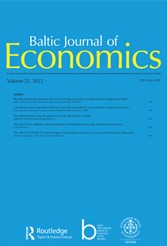Passive vs active robo-advisors and disposition effect. Moderating role of gender and financial literacy
Passive vs active robo-advisors and disposition effect. Moderating role of gender and financial literacy
Author(s): Nomeda Lisauskiene, Valdonė Darškuvienė, Mindaugas ButkusSubject(s): Gender Studies, Supranational / Global Economy, Information Architecture, Electronic information storage and retrieval, Economic development, ICT Information and Communications Technologies, Socio-Economic Research
Published by: BICEPS/SSE Riga
Keywords: Robo-advisors; disposition effect; dual process theory; financial literacy; gender role;
Summary/Abstract: The study examines links between automated advisory services and irrational individual investors’ behaviour based on dual-process theory. The study contributes to the literature on active vs. passive digital nudges in robo-advisors and the disposition effect. Selfreporting online experiment revealed that robo-advisors help investors to resolve cognitive dissonance, with passive robo-advisors being more efficient. We contribute by introducing and indicating the moderating role of financial literacy. Though moderating feminine gender role was not supported, the need for customized automated advisory services is highlighted. The results are important for individual welfare, as demographic shifts and evolving retirement systems transfer investment decisions to individuals.
Journal: Baltic Journal of Economics
- Issue Year: 24/2024
- Issue No: 2
- Page Range: 239-260
- Page Count: 22
- Language: English

